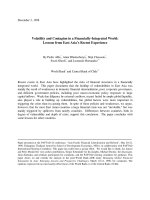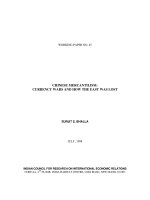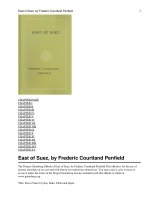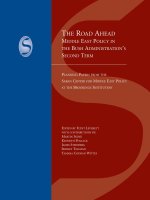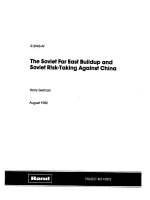East lynne
Bạn đang xem bản rút gọn của tài liệu. Xem và tải ngay bản đầy đủ của tài liệu tại đây (2.02 MB, 526 trang )
TheProjectGutenbergEBookofEastLynne,byMrs.HenryWood
ThiseBookisfortheuseofanyoneanywhereatnocostandwith
almostnorestrictionswhatsoever.Youmaycopyit,giveitawayor
re-useitunderthetermsoftheProjectGutenbergLicenseincluded
withthiseBookoronlineatwww.gutenberg.org
Title:EastLynne
Author:Mrs.HenryWood
ReleaseDate:April5,2006[EBook#3322]
LastUpdated:November20,2016
Language:English
***STARTOFTHISPROJECTGUTENBERGEBOOKEASTLYNNE***
ProducedbyDagny;JohnBickers;DavidWidger
EASTLYNNE
byMrs.HenryWood
PREPARER’SNOTE
Thistextwaspreparedfroman1883edition,
NewYork:JohnB.Alden,Publisher.
CONTENTS
EASTLYNNE
CHAPTERI.
CHAPTERII.
CHAPTERIII.
CHAPTERIV.
CHAPTERV.
CHAPTERVI.
CHAPTERVII.
CHAPTERVIII.
CHAPTERIX.
CHAPTERX.
CHAPTERXI.
CHAPTERXII.
CHAPTERXIII.
CHAPTERXIV.
CHAPTERXV.
CHAPTERXVI.
CHAPTERXVII.
CHAPTERXVIII.
CHAPTERXIX.
CHAPTERXX.
CHAPTERXXI.
CHAPTERXXII.
CHAPTERXXIII.
CHAPTERXXIV.
CHAPTERXXV.
CHAPTERXXVI.
CHAPTERXXVII.
CHAPTERXXVIII.
CHAPTERXXIX.
CHAPTERXXX.
CHAPTERXXXI.
CHAPTERXXXII.
CHAPTERXXXIII.
CHAPTERXXXIV.
CHAPTERXXXV.
CHAPTERXXXVI.
CHAPTERXXXVII.
CHAPTERXXXVIII.
CHAPTERXXXIX.
CHAPTERXL.
CHAPTERXLI.
CHAPTERXLII.
CHAPTERXLIII.
CHAPTERXLIV.
CHAPTERXLV.
CHAPTERXLVI.
CHAPTERXLVII.
EASTLYNNE
CHAPTERI.
THELADYISABEL.
Inaneasy-chairofthespaciousandhandsomelibraryofhistown-house,sat
William, Earl of Mount Severn. His hair was gray, the smoothness of his
expansivebrowwasdefacedbyprematurewrinkles,andhisonceattractiveface
bore the pale, unmistakable look of dissipation. One of his feet was cased in
foldsoflinen,asitrestedonthesoftvelvetottoman,speakingofgoutasplainly
asanyfooteverspokeyet.Itwouldseem—tolookatthemanashesatthere—
thathehadgrownoldbeforehistime.Andsohehad.Hisyearswerebarelynine
andforty,yetinallsaveyears,hewasanagedman.
AnotedcharacterhadbeentheEarlofMountSevern.Notthathehadbeena
renowned politician, or a great general, or an eminent statesman, or even an
activememberintheUpperHouse;notforanyofthesehadtheearl’snamebeen
in the mouths of men. But for the most reckless among the reckless, for the
spendthriftamongspendthrifts,forthegamesteraboveallgamesters,andfora
gaymanoutstrippingthegay—bythesecharacteristicsdidtheworldknowLord
MountSevern.Itwassaidhisfaultswerethoseofhishead;thatabetterheartor
amoregenerousspiritneverbeatinhumanform;andtherewasmuchtruthin
this.IthadbeenwellforhimhadhelivedanddiedplainWilliamVane.Upto
his five and twentieth year, he had been industrious and steady, had kept his
termsintheTemple,andstudiedlateandearly.ThesoberapplicationofWilliam
Vanehadbeenabywordwiththeembryobarristersaround;JudgeVane,they
ironicallycalledhim;andtheystroveineffectuallytoallurehimawaytoidleness
and pleasure. But young Vane was ambitious, and he knew that on his own
talents and exertions must depend his own rising in the world. He was of
excellentfamily,butpoor,countingarelativeintheoldEarlofMountSevern.
Thepossibilityofhissucceedingtotheearldomneveroccurredtohim,forthree
healthy lives, two of them young, stood between him and the title. Yet those
have died off, one of apoplexy, one of fever, in Africa, the third boating at
Oxford; and the young Temple student, William Vane, suddenly found himself
EarlofMountSevern,andthelawfulpossessorofsixtythousandayear.
Hisfirstideawas,thatheshouldneverbeabletospendthemoney;thatsuch
asum,yearbyyear,couldnotbespent.Itwasawonderhisheadwasnotturned
by adulation at the onset, for he was courted, flattered and caressed by all
classes,fromaroyaldukedownward.Hebecamethemostattractivemanofhis
day,thelioninsociety;forindependentofhisnewly-acquiredwealthandtitle,
hewasofdistinguishedappearanceandfascinatingmanners.Butunfortunately,
the prudence which had sustained William Vane, the poor law student, in his
solitary Temple chambers entirely forsook William Vane, the young Earl of
MountSevern,andhecommencedhiscareeronascaleofspeedsogreat,thatall
staidpeoplesaidhewasgoingtoruinandthedeuceheadlong.
Butapeeroftherealm,andonewhoserent-rollissixtythousandperannum,
doesnotgotoruininaday.Theresattheearl,inhislibrarynow,inhisnineand-fortieth year, and ruin had not come yet—that is, it had not overwhelmed
him.Buttheembarrassmentswhichhadclungtohim,andbeenthedestruction
ofhistranquility,thebaneofhisexistence,whoshalldescribethem?Thepublic
knew them pretty well, his private friends knew better, his creditors best; but
none,savehimselfknew,orcouldeverknow,theworryingtormentthatwashis
portion,wellnighdrivinghimtodistraction.Yearsago,bydintoflookingthings
steadilyinthe face,and byeconomizing, he mighthaveretrievedhis position;
but he had done what most people do in such cases—put off the evil day sine
die,andgoneonincreasinghisenormouslistofdebts.Thehourofexposureand
ruinwasnowadvancingfast.
Perhapstheearlhimselfwasthinkingso,ashesattherebeforeanenormous
mass of papers which strewed the library table. His thoughts were back in the
past.Thatwasafoolishmatchofhis,thatGretnaGreenmatchforlove,foolish
sofarasprudencewent;butthecountesshadbeenanaffectionatewifetohim,
hadbornewithhisfolliesandhisneglect,hadbeenanadmirablemothertotheir
only child. One child alone had been theirs, and in her thirteenth year the
countess had died. If they had but been blessed with a son—the earl moaned
overthelong-continueddisappointmentstill—hemighthaveseenawayoutof
hisdifficulties.Theboy,assoonashewasofage,wouldhavejoinedwithhimin
cuttingofftheentail,and——
“Mylord,”saidaservantenteringtheroomandinterruptingtheearl’scastles
intheair,“agentlemanisaskingtoseeyou.”
“Who?”criedtheearl,sharply,notperceivingthecardthemanwasbringing.
No unknown person, although wearing the externals of a foreign ambassador,
was ever admitted unceremoniously to the presence of Lord Mount Severn.
Yearsofdunshadtaughttheservantscaution.
“Hiscardishere,mylord.ItisMr.Carlyle,ofWestLynne.”
“Mr.Carlyle,ofWestLynne,”groanedtheearl,whosefootjustthenhadan
awfultwinge,“whatdoeshewant?Showhimup.”
Theservantdidashewasbid,andintroducedMr.Carlyle.Lookatthevisitor
well,reader,forhewillplayhispartinthishistory.Hewasaverytallmanof
seven and twenty, of remarkably noble presence. He was somewhat given to
stooping his head when he spoke to any one shorter than himself; it was a
peculiarhabit,almosttobecalledabowinghabit,andhisfatherhadpossessedit
before him. When told of it he would laugh, and say he was unconscious of
doing it. His features were good, his complexion was pale and clear, his hair
dark,andhisfulleyelids droopedoverhisdeepgrayeyes.Altogether itwasa
countenance that both men and women liked to look upon—the index of an
honorable,sincerenature—notthatitwouldhavebeencalledahandsomeface,
somuchasapleasingandadistinguishedone.Thoughbutthesonofacountry
lawyer, and destined to be a lawyer himself, he had received the training of a
gentleman, had been educated at Rugby, and taken his degree at Oxford. He
advancedatoncetotheearl,inthestraightforwardwayofamanofbusiness—
ofamanwhohascomeonbusiness.
“Mr. Carlyle,” said the latter, holding out his hand—he was always deemed
themostaffablepeeroftheage—“Iamhappytoseeyou.YouperceiveIcannot
rise, at least without great pain and inconvenience. My enemy, the gout, has
possessionofmeagain.Takeaseat.Areyoustayingintown?”
“IhavejustarrivedfromWestLynne.Thechiefobjectofmyjourneywasto
seeyourlordship.”
“WhatcanIdoforyou?”askedtheearl,uneasily;forasuspicionhadcrossed
hismindthatMr.Carlylemightbeactingforsomeoneofhismanytroublesome
creditors.
Mr.Carlyledrewhischairnearertotheearl,andspokeinalowtone,—
“Arumorcametomyears,mylord,thatEastLynnewasinthemarket.”
“A moment, sir,” exclaimed the earl, with reserve, not to say hauteur in his
tone,forhissuspicionsweregainingground;“arewetoconverseconfidentially
together,asmenofhonor,oristheresomethingconcealedbehind?”
“Idonotunderstandyou,”saidMr.Carlyle.
“Inaword—excusemyspeakingplainly,butImustfeelmyground—areyou
here on the part of some of my rascally creditors, to pump information out of
me,thatotherwisetheywouldnotget?”
“My lord,” uttered the visitor, “I should be incapable of so dishonorable an
action. I know that a lawyer gets credit for possessing but lax notions on the
scoreofhonor,butyoucanscarcelysuspectthatIshouldbeguiltyofunderhand
work toward you. I never was guilty of a mean trick in my life, to my
recollection,andIdonotthinkIevershallbe.”
“Pardonme,Mr.Carlyle. If youknew halfthetricks andruses playedupon
me, you would not wonder at my suspecting all the world. Proceed with your
business.”
“IheardthatEastLynnewasforprivatesale;youragentdroppedhalfaword
tomeinconfidence.Ifso,Ishouldwishtobethepurchaser.”
“Forwhom?”inquiredtheearl.
“Myself.”
“You!”laughedtheearl.“Egad!Lawyeringcan’tbesuchbadwork,Carlyle.”
“Nor is it,” rejoined Mr. Carlyle, “with an extensive, first-class connection,
such as ours. But you must remember that a good fortune was left me by my
uncle,andalargeonebymyfather.”
“Iknow.Theproceedsoflawyeringalso.”
“Notaltogether.Mymotherbroughtafortuneonhermarriage,anditenabled
my father to speculate successfully. I have been looking out for an eligible
propertytoinvestmymoneyupon,andEastLynnewillsuitmewell,providedI
canhavetherefusalofit,andwecanagreeabouttheterms.”
LordMountSevernmusedforafewmomentsbeforehespoke.“Mr.Carlyle,”
he began, “my affairs are very bad, and ready money I must find somewhere.
NowEastLynneisnotentailed,neitherisitmortgagedtoanythinglikeitsvalue,
though the latter fact, as you may imagine, is not patent to the world. When I
boughtitatabargain,eighteenyearsago,youwerethelawyerontheotherside,
Iremember.”
“Myfather,”smiledMr.Carlyle.“Iwasachildatthetime.”
“Of course, I ought to have said your father. By selling East Lynne, a few
thousandswillcomeintomyhands,afterclaimsonitaresettled;Ihavenoother
meansofraisingthewind,andthatiswhyIhaveresolvedtopartwithit.But
now, understand, if it were known abroad that East Lynne is going from me, I
should have a hornet’s nest about my ears; so that it must be disposed of
privately.Doyoucomprehend?”
“Perfectly,”repliedMr.Carlyle.
“I would as soon you bought it as anyone else, if, as you say, we can agree
aboutterms.”
“Whatdoesyourlordshipexpectforit—ataroughestimate?”
“ForparticularsImustreferyoutomymenofbusiness,Warburton&Ware.
Notlessthanseventythousandpounds.”
“Toomuch,mylord,”criedMr.Carlyle,decisively.
“Andthat’snotitsvalue,”returnedtheearl.
“Theseforcedsalesneverdofetchtheirvalue,”answeredtheplain-speaking
lawyer.“UntilthishintwasgivenmebyBeauchamp,IhadthoughtEastLynne
wassettleduponyourlordship’sdaughter.”
“There’snothingsettledonher,”rejoinedtheearl,thecontractiononhisbrow
standingoutmoreplainly.“Thatcomesofyourthoughtlessrunawaymarriages.I
fellinlovewithGeneralConway’sdaughter,andsheranawaywithme,likea
fool;thatis,wewerebothfoolstogetherforourpains.Thegeneralobjectedto
meandsaidImustsowmywildoatsbeforehewouldgivemeMary;soItook
her to Gretna Green, and she became Countess of Mount Severn, without a
settlement.Itwasanunfortunateaffair,takingonethingwithanother.Whenher
elopementwasmadeknowntothegeneral,itkilledhim.”
“Killedhim!”interruptedMr.Carlyle.
“Itdid.Hehaddiseaseoftheheart,andtheexcitementbroughtonthecrisis.
My poor wife never was happy from that hour; she blamed herself for her
father’sdeath,andIbelieveitledtoherown.Shewasillforyears;thedoctors
called it consumption; but it was more like a wasting insensibly away, and
consumption never had been in her family. No luck ever attends runaway
marriages; I have noticed it since, in many, many instances; something bad is
suretoturnupfromit.”
“There might have been a settlement executed after the marriage,” observed
Mr.Carlyle,fortheearlhadstopped,andseemedlostinthought.
“Iknowtheremight;buttherewasnot.Mywifehadpossessednofortune;I
was already deep in my career of extravagance, and neither of us thought of
makingprovisionforourfuturechildren;or,ifwethoughtofit,wedidnotdoit.
Thereisanoldsaying,Mr.Carlyle,thatwhatmaybedoneatanytimeisnever
done.”
Mr.Carlylebowed.
“Somychildisportionless,”resumedtheearl,withasuppressedsigh.“The
thoughtthatitmaybeanembarrassingthingforher,wereItodiebeforesheis
settled in life, crosses my mind when I am in a serious mood. That she will
marry well, there is little doubt, for she possesses beauty in a rare degree, and
has been reared as an English girl should be, not to frivolity and foppery. She
wastrainedbyhermother,whosaveforthemadactshewaspersuadedintoby
me,wasallgoodnessandrefinement,forthefirsttwelveyearsofherlife,and
since then by an admirable governess. No fear that she will be decamping to
GretnaGreen.”
“Shewasaverylovelychild,”observedthelawyer;“Irememberthat.”
“Ay;youhaveseenheratEastLynne,inhermother’slifetime.But,toreturn
tobusiness.IfyoubecomethepurchaseroftheEastLynneestate,Mr.Carlyle,it
mustbeundertherose.Themoneythatitbrings,afterpayingoffthemortgage,I
musthave,asItellyou,formyprivateuse;andyouknowIshouldnotbeableto
touchafarthingofitiftheconfoundedpublicgotaninklingofthetransfer.In
theeyesoftheworld,theproprietorofEastLynnemustbeLordMountSevern
—atleastforsomelittletimeafterwards.Perhapsyouwillnotobjecttothat.”
Mr. Carlyle considered before replying; and then the conversation was
resumed,whenitwasdecidedthatheshouldseeWarburtonandWarethefirst
thinginthemorning,andconferwiththem.Itwasgrowinglatewhenheroseto
leave.
“Stayanddinewithme,”saidtheearl.
Mr. Carlyle hesitated, and looked down at his dress—a plain, gentlemanly,
morningattire,butcertainlynotadinnercostumeforapeer’stable.
“Oh, that’s nothing,” said the earl; “we shall be quite alone, except my
daughter. Mrs. Vane, of Castle Marling, is staying with us. She came up to
presentmychildatthelastdrawing-room,butIthinkIheardsomethingabout
her dining out to-day. If not, we will have it by ourselves here. Oblige me by
touchingthebell,Mr.Carlyle.”
Theservantentered.
“InquirewhetherMrs.Vanedinesathome,”saidtheearl.
“Mrs.Vanedinesout,mylord,”wastheman’simmediatereply.“Thecarriage
isatthedoornow.”
“Verywell.Mr.Carlyleremains.”
At seven o’clock the dinner was announced, and the earl wheeled into the
adjoining room. As he and Mr. Carlyle entered it at one door, some one else
cameinbytheoppositeone.Who—what—wasit?Mr.Carlylelooked,notquite
surewhetheritwasahumanbeing—healmostthoughtitmorelikeanangel.
Alight,graceful,girlishform;afaceofsurpassingbeauty,beautythatisrarely
seen, save from the imagination of a painter; dark shining curls falling on her
neck and shoulders, smooth as a child’s; fair, delicate arms decorated with
pearls,andaflowingdressofcostlywhitelace.Altogetherthevisiondidindeed
looktothelawyerasonefromafairerworldthanthis.
“Mydaughter,Mr.Carlyle,theLadyIsabel.”
Theytooktheirseatsatthetable,LordMountSevernatitshead,inspiteof
his gout and his footstool. And the young lady and Mr. Carlyle opposite each
other. Mr. Carlyle had not deemed himself a particular admirer of women’s
beauty,buttheextraordinarylovelinessoftheyounggirlbeforehimnearlytook
away his senses and his self-possession. Yet it was not so much the perfect
contour or the exquisite features that struck him, or the rich damask of the
delicatecheek,ortheluxuriantfallinghair;no,itwasthesweetexpressionofthe
softdarkeyes.Neverinhislifehadheseeneyessopleasing.Hecouldnotkeep
hisgazefromher,andhebecameconscious,ashegrewmorefamiliarwithher
face,thattherewasinitscharacterasad,sorrowfullook;onlyattimeswasitto
benoticed,whenthefeatureswereatrepose,anditlaychieflyintheveryeyes
hewasadmiring.Neverdoesthisunconsciouslymournfulexpressionexist,but
itisasureindexofsorrowandsuffering;butMr.Carlyleunderstooditnot.And
whocouldconnectsorrowwiththeanticipatedbrilliantfutureofIsabelVane?
“Isabel,”observedtheearl,“youaredressed.”
“Yes, papa. Not to keep old Mrs. Levison waiting tea. She likes to take it
early,andIknowMrs.Vanemusthavekeptherwaitingdinner.Itwashalf-past
sixwhenshedrovefromhere.”
“Ihopeyouwillnotbelateto-night,Isabel.”
“ItdependsuponMrs.Vane.”
“ThenIamsureyouwillbe.Whentheyoungladiesinthisfashionableworld
ofoursturnnightintoday,itisabadthingfortheirroses.Whatsayyou,Mr.
Carlyle?”
Mr. Carlyle glanced at the roses on the cheeks opposite to him; they looked
toofreshandbrighttofadelightly.
At the conclusion of dinner a maid entered the room with a white cashmere
mantle,placingitovertheshouldersofheryounglady,asshesaidthecarriage
waswaiting.
LadyIsabeladvancedtotheearl.“Good-bye,papa.”
“Good-night,mylove,”heanswered,drawinghertowardhim,andkissingher
sweetface.“TellMrs.VaneIwillnothaveyoukeptouttillmorninghours.You
are but a child yet. Mr. Carlyle, will you ring? I am debarred from seeing my
daughtertothecarriage.”
“Ifyourlordshipwillallowme—ifLadyIsabelwillpardontheattendanceof
one little used to wait upon young ladies, I shall be proud to see her to her
carriage,”wasthesomewhatconfusedanswerofMr.Carlyleashetouchedthe
bell.
Theearlthankedhim,andtheyoungladysmiled,andMr.Carlyleconducted
her down the broad, lighted staircase and stood bareheaded by the door of the
luxuriouschariot,andhandedherin.Sheputoutherhandinherfrank,pleasant
manner,asshewishedhimgoodnight.Thecarriagerolledonitsway,andMr.
Carlylereturnedtotheearl.
“Well,isshenotahandsomegirl?”hedemanded.
“Handsomeisnotthewordforbeautysuchashers,”wasMr.Carlyle’sreply,
inalow,warmtone.“Ineversawafacehalfsobeautiful.”
“Shecausedquiteasensationatthedrawing-roomlastweek—asIhear.This
everlastinggoutkeptmeindoorsallday.Andsheisasgoodassheisbeautiful.”
The earl was not partial. Lady Isabel was wondrously gifted by nature, not
onlyinmindandpersonbutinheart.Shewasaslittlelikeafashionableyoung
ladyasitwaswellpossibletobe,partlybecauseshehadhithertobeensecluded
from the great world, partly from the care bestowed upon her training. During
thelifetimeofhermother,shehadlivedoccasionallyatEastLynne,butmostly
atalargerseatoftheearl’sinWales,MountSevern;sincehermother’sdeath,
she had remained entirely at Mount Severn, under the charge of a judicious
governess,averysmallestablishmentbeingkeptforthem,andtheearlpaying
themimpromptuandflyingvisits.Generousandbenevolentshewas,timidand
sensitivetoadegree,gentle,andconsideratetoall.Donotcavilatherbeingthus
praised—admire and love her whilst you may, she is worthy of it now, in her
innocent girlhood; the time will come when such praise would be misplaced.
Couldthefatethatwastoovertakehischildhavebeenforeseenbytheearl,he
wouldhavestruckherdowntodeath,inhislove,asshestoodbeforehim,rather
thansufferhertoenteruponit.
CHAPTERII.
THEBROKENCROSS.
LadyIsabel’scarriagecontinueditsway,anddepositedherattheresidenceof
Mrs.Levison.Mrs.Levisonwasnearlyeightyyearsofage,andveryseverein
speech and manner, or, as Mrs. Vane expressed it, “crabbed.” She looked the
image of impatience when Isabel entered, with her cap pushed all awry, and
pullingattheblacksatingown,forMrs.Vanehadkeptherwaitingdinner,and
Isabelwaskeepingherfromhertea;andthatdoesnotagreewiththeaged,with
theirhealthorwiththeirtemper.
“I fear I am late,” exclaimed Lady Isabel, as she advanced to Mrs. Levison;
“butagentlemandinedwithpapato-day,anditmadeusratherlongerattable.”
“You are twenty-five minutes behind your time,” cried the old lady sharply,
“andIwantmytea.Emma,orderitin.”
Mrs.Vanerangthebell,anddidasshewasbid.Shewasalittlewomanofsixand-twenty,veryplaininface,butelegantinfigure,veryaccomplished,andvain
to her fingers’ ends. Her mother, who was dead, had been Mrs. Levison’s
daughter,andherhusband,RaymondVane,waspresumptiveheirtotheearldom
ofMountSevern.
“Won’t you take that tippet off, child?” asked Mrs. Levison, who knew
nothingofthenew-fashionednamesforsucharticles,mantles,burnous,andall
thestringofthem;andIsabelthrewitoffandsatdownbyher.
“The tea is not made, grandmamma!” exclaimed Mrs. Vane, in an accent of
astonishment, as the servant appeared with the tray and the silver urn. “You
surelydonothaveitmadeintheroom.”
“WhereshouldIhaveitmade?”inquiredMrs.Levison.
“It is much more convenient to have it brought in, ready made,” said Mrs.
Vane.“Idisliketheembarassofmakingit.”
“Indeed!” was the reply of the old lady; “and get it slopped over in the
saucers, and as cold as milk! You always were lazy, Emma—and given to use
thoseFrenchwords.I’dratherstickaprintedlabelonmyforehead,formypart,
‘IspeakFrench,’andlettheworldknowitinthatway.”
“Who makes tea for you in general?” asked Mrs. Vane, telegraphing a
contemptuousglancetoIsabelbehindhergrandmother.
ButtheeyesofLadyIsabelfelltimidlyandablushrosetohercheeks.Shedid
notliketoappeartodifferfromMrs.Vane,hersenior,andherfather’sguest,but
her mind revolted at the bare idea of ingratitude or ridicule cast on an aged
parent.
“Harrietcomesinandmakesitforme,”repliedMrs.Levison;“aye,andsits
downandtakesitwithmewhenIamalone,whichisprettyoften.Whatdoyou
saytothat,MadameEmma—you,withyourfinenotions?”
“Justasyouplease,ofcourse,grandmamma.”
“And there’sthe tea-caddyatyourelbow,and theurn’s fizzingaway,andif
wearetohaveanyteato-night,ithadbetterbemade.”
“Idon’tknowhowmuchtoputin,”grumbledMrs.Vane,whohadthegreatest
horror of soiling her hands or her gloves; who, in short, had a particular
antipathytodoinganythinguseful.
“ShallImakeit,dearMrs.Levison?”saidIsabel,risingwithalacrity.“Ihad
usedtomakeitquiteasoftenasmygovernessatMountSevern,andImakeit
forpapa.”
“Do,child,”repliedtheoldlady.“Youareworthtenofher.”
Isabellaughedmerrily,drewoffhergloves,andsatdowntothetable;andat
thatmomentayoungandelegantmanloungedintotheroom.Hewasdeemed
handsome, with his clearly-cut features, his dark eyes, his raven hair, and his
white teeth; but to a keen observer those features had not an attractive
expression,andthedarkeyeshadagreatknackoflookingawaywhilehespoke
toyou.ItwasFrancis,CaptainLevison.
Hewasgrandsontotheoldlady,andfirstcousintoMrs.Vane.Fewmenwere
so fascinating in manners, at times and seasons, in face and in form, few men
won so completely upon their hearers’ ears, and few were so heartless in their
heartsofhearts.Theworldcourtedhim,andsocietyhonoredhim;for,thoughhe
was a graceless spendthrift, and it was known that he was, he was the
presumptiveheirtotheoldandrichSirPeterLevison.
Theancientladyspokeup,“CaptainLevison,LadyIsabelVane.”Theyboth
acknowledgedtheintroduction;andIsabel,achildyetinthewaysoftheworld,
flushed crimson at the admiring looks cast upon her by the young guardsman.
Strange—strangethatsheshouldmaketheacquaintanceofthesetwomeninthe
sameday,almostinthesamehour;thetwo,ofallthehumanrace,whowereto
exercisesopowerfulaninfluenceoverherfuturelife!
“That’saprettycross,child,”criedMrs.LevisonasIsabelstoodbyherwhen
teawasover,andsheandMrs.Vanewereabouttodepartontheireveningvisit.
Shealludedtoagoldencross,setwithsevenemeralds,whichIsabelworeon
herneck.Itwasoflight,delicatetexture,andwassuspendedfromathin,short,
goldchain.
“Isitnotpretty?”answeredIsabel.“Itwasgivenmebymydearmammajust
before she died. Stay, I will take it off for you. I only wear it upon great
occasions.”
This,herfirstappearanceatthegrandduke’s,seemedaverygreatoccasionto
thesimply-rearedandinexperiencedgirl.Sheunclaspedthechain,andplacedit
withthecrossinthehandsofMrs.Levison.
“Why,Ideclareyouhavenothingonbutthatcrossandsomerubbishingpearl
bracelets!”utteredMrs.VanetoIsabel.“Ididnotlookatyoubefore.”
“Mammagavemeboth.Thebraceletsarethosesheusedfrequentlytowear.”
“You old-fashioned child! Because your mamma wore those bracelets, years
ago,isthatareasonforyourdoingso?”retortedMrs.Vane.“Whydidyounot
putonyourdiamonds?”
“I—did—put on my diamonds; but I—took them off again,” stammered
Isabel.
“Whatonearthfor?”
“I did not like to look too fine,” answered Isabel, with a laugh and a blush.
“Theyglitteredso!IfeareditmightbethoughtIhadputthemontolookfine.”
“Ah!Iseeyoumeantosetupinthatclassofpeoplewhopretendtodespise
ornaments,”scornfullyremarkedMrs.Vane.“Itistherefinementofaffectation,
LadyIsabel.”
ThesneerfellharmlesslyonLadyIsabel’sear.Sheonlybelievedsomething
had put Mrs. Vane out of temper. It certainly had; and that something, though
Isabellittlesuspectedit,wastheevidentadmirationCaptainLevisonevincedfor
herfresh,youngbeauty;itquiteabsorbedhim,andrenderedhimneglectfuleven
ofMrs.Vane.
“Here,child,takeyourcross,”saidtheoldlady.“Itisverypretty;prettieron
your neck than diamonds would be. You don’t want embellishing; never mind
whatEmmasays.”
FrancisLevisontookthecrossandchainfromherhandtopassthemtoLady
Isabel.Whetherhewasawkward,orwhetherherhandswerefull,forsheheld
hergloves,herhandkerchief,andhadjusttakenuphermantle,certainitisthatit
fell; and the gentleman, in his too quick effort to regain it, managed to set his
footuponit,andthecrosswasbrokenintwo.
“There!Nowwhosefaultwasthat?”criedMrs.Levison.
Isabeldidnotanswer;herheartwasveryfull.Shetookthebrokencross,and
thetearsdroppedfromhereyes;shecouldnothelpit.
“Why! You are never crying over a stupid bauble of a cross!” uttered Mrs.
Vane,interruptingCaptainLevison’sexpressionofregretathisawkwardness.
“Youcanhaveitmended,dear,”interposedMrs.Levison.
Lady Isabel chased away the tears, and turned to Captain Levison with a
cheerfullook.“Praydonotblameyourself,”shegood-naturedlysaid;“thefault
wasasmuchmineasyours;and,asMrs.Levisonsays,Icangetitmended.”
Shedisengagedtheupperpartofthecrossfromthechainasshespoke,and
claspedthelatterroundherthroat.
“You will not go with that thin string of gold on, and nothing else!” uttered
Mrs.Vane.
“Why not?” returned Isabel. “If people say anything, I can tell them an
accidenthappenedtothecross.”
Mrs.Vaneburstintoalaughofmockingridicule.“‘Ifpeoplesayanything!’”
she repeated, in a tone according with the laugh. “They are not likely to ‘say
anything,’buttheywilldeemLordMountSevern’sdaughterunfortunatelyshort
ofjewellery.”
Isabel smiled and shook her head. “They saw my diamonds at the drawingroom.”
“Ifyouhaddonesuchanawkwardthingforme,FrankLevison,”burstforth
theoldlady,“mydoorsshouldhavebeenclosedagainstyouforamonth.There,
ifyouaretogo,Emma,youhadbettergo;dancingofftobeginaneveningatten
o’clockatnight!Inmytimeweusedtogoatseven;butit’sthecustomnowto
turnnightintoday.”
“When George the Third dined at one o’clock upon boiled mutton and
turnips,”putinthegracelesscaptain,whocertainlyheldhisgrandmotherinno
greaterreverencethandidMrs.Vane.
He turned to Isabel as he spoke, to hand her downstairs. Thus she was
conductedtohercarriagethesecondtimethatnightbyastranger.Mrs.Vanegot
down by herself, as she best could, and her temper was not improved by the
process.
“Good-night,”saidshetothecaptain.
“Ishallnotsaygood-night.Youwillfindmetherealmostassoonasyou.”
“Youtoldmeyouwerenotcoming.Somebachelor’spartyintheway.”
“Yes,butIhavechangedmymind.Farewellforthepresent,LadyIsabel.”
“Whatanobjectyouwilllook,withnothingonyourneckbutaschoolgirl’s
chain!”beganMrs.Vane,returningtothegrievanceasthecarriagedroveon.
“Oh,Mrs.Vane,whatdoesitsignify?Icanonlythinkofmybrokencross.I
amsureitmustbeanevilomen.”
“Anevil—what?”
“Anevilomen.Mammagavemethatcrosswhenshewasdying.Shetoldme
toletitbetomeasatalisman,alwaystokeepitsafely;andwhenIwasinany
distress,orinneedofcounsel,tolookatitandstrivetorecallwhatheradvice
wouldbe,andtoactaccordingly.Andnowitisbroken—broken!”
A glaring gaslight flashed into the carriage, right into the face of Isabel. “I
declare,”utteredMrs.Vane,“youarecryingagain!Itellyouwhatitis,Isabel,I
amnotgoingtochaperoneredeyestotheDuchessofDartford’s,soifyoucan’t
putastoptothis,Ishallorderthecarriagehome,andgoonalone.”
Isabel meekly dried her eyes, sighing deeply as she did so. “I can have the
piecesjoined,Idaresay;butitwillneverbethesamecrosstomeagain.”
“Whathaveyoudonewiththepieces?”irasciblyaskedMrs.Vane.
“IfoldedtheminthethinpaperMrs.Levisongaveme,andputitinsidemy
frock.Hereitis,”touchingthebody.“Ihavenopocketon.”
Mrs.Vanegave vent toagroan.She neverhadbeen agirlherself—shehad
beenawomanatten;andshecomplimentedIsabeluponbeinglittlebetterthan
animbecile.“Putitinsidemyfrock!”sheutteredinatorrentofscorn.“Andyou
eighteenyearsofage!Ifanciedyouleftoff‘frocks’whenyouleftthenursery.
Forshame,Isabel!”
“Imeanttosaymydress,”correctedIsabel.
“Meanttosayyouareababyidiot!”wastheinwardcommentofMrs.Vane.
AfewminutesandIsabelforgothergrievance.Thebrilliantroomsweretoher
asanenchantingsceneofdreamland,forherheartwasinitsspringtideofearly
freshness,andthesatietyofexperiencehadnotcome.Howcouldsheremember
trouble,eventhebrokencross,asshebenttothehomageofferedheranddrank
inthehoneyedwordspouredforthintoherear?
“Halloo!” cried an Oxford student, with a long rent-roll in prospective, who
wasscrewinghimselfagainstthewall,nottobeinthewayofthewaltzers,“I
thoughtyouhadgivenupcomingtotheseplaces?”
“SoIhad,”repliedthefastnoblemanaddressed,thesonofamarquis.“ButI
amonthelookout,soamforcedintothemagain.Ithinkaball-roomthegreatest
boreinlife.”
“Onthelookoutforwhat?”
“Forawife.Mygovernorhasstoppedsupplies,andhasvowedbyhisbeard
nottoadvanceanothershilling,orpayadebt,tillIreform.Asapreliminarystep
towardit,heinsistsuponawife,andIamtryingtochooseoneforIamdeeper
indebtthanyouimagine.”
“Takethenewbeauty,then.”
“Whoisshe?”
“LadyIsabelVane.”
“Much obliged for the suggestion,” replied the earl. “But one likes a
respectablefather-in-law,andMountSevernisgoingtosmash.HeandIaretoo
muchinthesameline,andmightclash,inthelongrun.”
“One can’t have everything; the girl’s beauty is beyond common. I saw that
rake, Levison, make up to her. He fancies he can carry all before him, where
womenareconcerned.”
“Sohedoes,often,”washisquietreply.
“I hate the fellow! He thinks so much of himself, with his curled hair and
shiningteeth,andhiswhiteskin;andhe’sasheartlessasanowl.Whatwasthat
hushed-upbusinessaboutMissCharteris?”
“Who’s to know? Levison slipped out of the escapade like an eel, and the
womanprotestedthathewasmoresinnedagainstthansinning.Three-fourthsof
theworldbelievedthem.”
“And she went abroad and died; and Levison here he comes! And Mount
Severn’sdaughterwithhim.”
Theywereapproachingatthatmoment,FrancisLevisonandLadyIsabel.He
wasexpressinghisregretattheuntowardaccidentofthecrossforthetenthtime
that night. “I feel that it can never be atoned for,” whispered he; “that the
heartfelthomageofmywholelifewouldnotbesufficientcompensation.”
Hespokeinatoneofthrillinggentleness,gratifyingtotheearbutdangerous
totheheart.LadyIsabelglancedup andcaughthiseyesgazing uponherwith
the deepest tenderness—a language hers had never yet encountered. A vivid
blushagainarosetohercheek,hereyelidsfell,andhertimidwordsdiedawayin
silence.
“Takecare,takecare,myyoungLadyIsabel,”murmuredtheOxonianunder
hisbreath,astheypassedhim,“thatmanisasfalseasheisfair.”
“Ithinkheisarascal,”remarkedtheearl.
“Iknowheis;Iknowathingortwoabouthim.Hewouldruinherheartfor
therenownoftheexploit,becauseshe’sabeauty,andthenflingitawaybroken.
Hehasnonetogiveinreturnforthegift.”
“Just as much as my new race-horse has,” concluded the earl. “She is very
beautiful.”
CHAPTERIII.
BARBARAHARE.
West Lynne was a town of some importance, particularly in its own eyes,
thoughbeingneitheramanufacturingonenoracathedralone,noreventhechief
town of the county, it was somewhat primitive in its manners and customs.
Passing out at the town, toward the east, you came upon several detached
gentleman’shouses,inthevicinityofwhichstoodthechurchofSt.Jude,which
wasmorearistocratic,inthematterofitscongregation,thantheotherchurches
ofWestLynne.Foraboutamilethesehouseswerescattered,thechurchbeing
situatedattheircommencement,closetothatbusypartoftheplace,andabouta
milefurtheronyoucameuponthebeautifulestatewhichwascalledEastLynne.
Betweenthegentlemen’shousesmentionedandEastLynne,themileofroad
wasverysolitary,beingmuchovershadowedwithtrees.Onehousealonestood
there,andthatwasaboutthree-quartersofamilebeforeyoucametoEastLynne.
Itwasonthelefthandside,asquare,ugly,redbrickhousewithaweathercock
on the top, standing some little distance from the road. A flat lawn extended
beforeit,andclosetothepalings,whichdivideditfromtheroad,wasagroveof
trees, some yards in depth. The lawn was divided by a narrow middle gravel
path, to which you gained access from the portico of the house. You entered
uponalargeflaggedhallwithareceptionroomoneitherhand,andthestaircase,
awideone,facingyou;bythesideofthestaircaseyoupassedontotheservants’
apartments and offices. That place was called the Grove, and was the property
andresidenceofRichardHare,Esq.,commonlycalledMr.JusticeHare.
Theroomtothelefthand,asyouwentin,wasthegeneralsitting-room;the
other was very much kept boxed up in lavender and brown Holland, to be
openedonstateoccasions.JusticeandMrs.Harehadthreechildren,asonand
twodaughters.Annewastheelderofthegirls,andhadmarriedyoung;Barbara,
the younger was now nineteen, and Richard the eldest—but we shall come to
himhereafter.
Inthissitting-room,onachillyevening,earlyinMay,afewdayssubsequent
tothatwhichhadwitnessedthevisitofMr.CarlyletotheEarlofMountSevern,
sat Mrs. Hare, a pale, delicate woman, buried in shawls and cushions: but the
day had been warm. At the window sat a pretty girl, very fair, with blue eyes,
light hair, a bright complexion, and small aquiline features. She was listlessly
turningovertheleavesofabook.
“Barbara,Iamsureitmustbetea-timenow.”
“Thetimeseemstomoveslowlywithyou,mamma.Itisscarcelyaquarterof
anhoursinceItoldyouitwasbuttenminutespastsix.”
“Iamsothirsty!”announcedthepoorinvalid.“Dogoandlookattheclock
again,Barbara.”
Barbara Hare rose with a gesture of impatience, not suppressed, opened the
door, and glanced at the large clock in the hall. “It wants nine and twenty
minutestoseven,mamma.Iwishyouwouldputyourwatchonofaday;four
timesyouhavesentmetolookatthatclocksincedinner.”
“I am so thirsty!” repeated Mrs. Hare, with a sort of sob. “If seven o’clock
wouldbutstrike!Iamdyingformytea.”
Itmayoccurtothereader,thataladyinherownhouse,“dyingforhertea,”
mightsurelyorderitbroughtin,althoughthecustomaryhourhadnotstruck.Not
soMrs.Hare.Sinceherhusbandhadfirstbroughtherhometothathouse,four
andtwenty-yearsago,shehadneverdaredtoexpressawillinit;scarcely,onher
own responsibility, to give an order. Justice Hare was stern, imperative,
obstinate, and self-conceited; she, timid, gentle and submissive. She had loved
himwithallherheart,andherlifehadbeenonelongyieldingofherwilltohis;
infact,shehadnowill;hiswasallinall.Farwasshefromfeelingtheservitude
ayoke:somenaturesdonot:andtodoMr.Harejustice,hispowerfulwillthat
mustbeardownallbeforeit,wasinfault:nothiskindness:henevermeanttobe
unkindtohiswife.Ofhisthreechildren,Barbaraalonehadinheritedhiswill.
“Barbara,” began Mrs. Hare again, when she thought another quarter of an
houratleastmusthaveelapsed.
“Well,mamma?”
“Ring, and tell them to be getting it in readiness so that when seven strikes
theremaybenodelay.”
“Goodness,mamma!Youknowtheydoalwayshaveitready.Andthere’sno
suchhurry,forpapamaynotbeathome.”Butsherose,andrangthebellwitha
petulant motion, and when the man answered it, told him to have tea in to its
time.
“Ifyouknewdear,howdrymythroatis,howparchedmymouth,youwould
havemorepatiencewithme.”
Barbaraclosedherbookwithalistlessair,andturnedlistlesslytothewindow.
Sheseemedtired,notwithfatiguebutwithwhattheFrenchexpressbytheword
ennui.“Herecomespapa,”shepresentlysaid.
“Oh,Iamsoglad!”criedpoorMrs.Hare.“Perhapshewillnotmindhaving
theteainatonce,ifItoldhimhowthirstyIam.”
The justice came in. A middle sized man, with pompous features, and a
pompous walk, and a flaxen wig. In his aquiline nose, compressed lips, and
pointed chin, might be traced a resemblance to his daughter; though he never
couldhavebeenhalfsogood-lookingaswasprettyBarbara.
“Richard,” spoke up Mrs. Hare from between her shawls, the instant he
openedthedoor.
“Well?”
“Wouldyoupleaseletmehaveteainnow?Wouldyouverymuchmindtaking
italittleearlierthisevening?Iamfeverishagain,andmytongueissoparchedI
don’tknowhowtospeak.”
“Oh,it’snearseven;youwon’thavelongtowait.”
With this exceedingly gracious answer to an invalid’s request, Mr. Hare
quitted the room again and banged the door. He had not spoken unkindly or
roughly, simply with indifference. But ere Mrs. Hare’s meek sigh of
disappointmentwasover,thedoorre-opened,andtheflaxenwig wasthrust in
again.
“Idon’tmindifIdohaveitnow.ItwillbeafinemoonlightnightandIam
goingwithPinnerasfarasBeauchamp’stosmokeapipe.Orderitin,Barbara.”
The tea was made and partaken of, and the justice departed for Mr.
Beauchamp’s,SquirePinnercallingfor himatthegate.Mr.Beauchampwasa
gentleman who farmed a great deal of land, and who was also Lord Mount
Severn’sagentorstewardforEastLynne.Helivedhigheruptheroadsomelittle
distancebeyondEastLynne.
“Iamsocold,Barbara,”shiveredMrs.Hare,asshewatchedthejusticedown
thegravelpath.“Iwonderifyourpapawouldsayitwasfoolishofme,ifItold
themtolightabitoffire?”
“Haveitlightedifyoulike,”respondedBarbara,ringingthebell.“Papawill
know nothing about it, one way or the other, for he won’t be home till after
bedtime.Jasper,mammaiscold,andwouldlikeafirelighted.”
“Plenty of sticks, Jasper, that it may burn up quickly,” said Mrs. Hare, in a
pleadingvoice,asifthestickswereJasper’sandnothers.
Mrs.Haregotherfire,andshedrewherchairinfront,andputherfeetonthe
fender, to catch its warmth. Barbara, listless still, went into the hall, took a
woolen shawl from the stand there, threw it over her shoulders, and went out.
She strolled down the straight formal path, and stood at the iron gate, looking
overitintothepublicroad.Notverypublicinthatspot,andatthathour,butas
lonely as one could wish. The night was calm and pleasant, though somewhat
chillyforthebeginningofMay,andthemoonwasgettinghighinthesky.
“Whenwillhecomehome?”shemurmured,assheleanedherheaduponthe
gate.“Oh,whatwouldlifebelikewithouthim?Howmiserablethesefewdays
have been! I wonder what took him there! I wonder what is detaining him!
Cornysaidhewasonlygoneforaday.”
The faint echo of footsteps in the distance stole upon her ear, and Barbara
drewalittleback,andhidherselfundertheshelterofthetrees,notchoosingto
be seen by any stray passer-by. But, as they drew near, a sudden change came
overher;hereyeslightedup,hercheeksweredyedwithcrimson,andherveins
tingled with excess of rapture—for she knew those footsteps, and loved them,
onlytoowell.
Cautiouslypeepingoverthegateagain,shelookeddowntheroad.Atallform,
whose very height and strength bore a grace of which its owner was
unconscious, was advancing rapidly toward her from the direction of West
Lynne.Againsheshrankaway;trueloveisevertimid;andwhatevermayhave
been Barbara Hare’s other qualities, her love at least was true and deep. But
instead of the gate opening, with the firm quick motion peculiar to the hand
which guided it, the footsteps seemed to pass, and not to have turned at all
towardit.Barbara’sheartsank,andshestoletothegateagain,andlookedout
withayearninglook.
Yes,sureenoughhewasstridingon,notthinkingofher,notcomingtoher;
andshe,inthedisappointmentandimpulseofthemoment,calledtohim,—
“Archibald!”
Mr.Carlyle—itwasnoother—turnedonhisheel,andapproachedthegate.
“Isityou,Barbara!Watchingforthievesandpoachers?Howareyou?”
“How are you?” she returned, holding the gate open for him to enter, as he
shookhands,andstrivingtocalmdownheragitation.“Whendidyoureturn?”
“Only now, by the eight o’clock train, which got in beyond its time, having
drawled unpardonably at the stations. They little thought they had me in it, as
theirlooksbetrayedwhenIgotout.Ihavenotbeenhomeyet.”
“No!WhatwillCorneliasay?”

